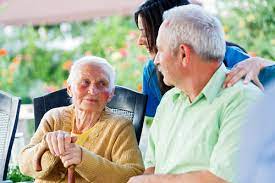Living with Parkinson’s Disease is very challenging. Rigid movements, tremors, poor balance, and coordination interfere with day-to-day tasks. As the condition progresses, the symptoms get worse and the person finds it difficult to walk and even talk. Moreover, the behavioral changes, memory issues, sleep problems, fatigue, and depression further make things worse.
It is the time when they require someone to be by their side 24X7 and help them with their regular chores.
There are several ways in which you can help your loved one suffering from Parkinson’s disease. Read further to understand how.
- Become their paid caregiver
Taking care of someone suffering from Parkinson’s is a round-the-clock duty. As Parkinson’s interferes with the motor skills of a person, it gets difficult for them to manage anything on their own, and more so, if they are in mid or advanced stages of this disease.
You cannot expect to do your job 9 to 5 and then care for your loved one during the evenings and night.
Becoming a paid caregiver is a viable option. Various CDPAP agencies like Freedomcare, assist the people who look forward to becoming paid caregivers. Reach out to the agency and enroll in a suitable plan.
- Educate yourself about Parkinson’s
Understanding the symptoms of Parkinson’s will help you help your loved one in a better way. Therefore, it is important to educate yourself about the disease.
Resort to reputed websites to get as much information as possible or read books on Parkinson’s. With all the knowledge in your arsenal, you will be better prepared to deal with the episodes.
- Include physical activity in your routine
Getting some physical movements is necessary for people with Parkinson’s and you as well.
According to some studies, exercise facilitates the release and use of dopamine by the brain. Dopamine is a chemical that affects motor physiology. Furthermore, physical activities help in boosting strength, balance, and memory.
Hence, encourage your loved one to stay active. Take them out for a walk or enroll in a yoga class. You can also consider signing up for a dance class with them. It would be great fun for both of you.
- Be patient with them
People with mid-stage Parkinson’s lose their ability to walk quickly or maintain their balance. They are independent but take time in doing any task like dressing or eating. The way they speak also gets affected. They may not be able to speak loudly and clearly. Be patient with them when going somewhere or having a conversation with them.
Consider reaching out to a physical therapist and a speech therapist who could help them improve their motor skills and speech.
- Help them in regular activities
They may feel embarrassed to ask for help, but someone with mid or advanced stages of Parkinson’s requires assistance in day-to-day activities like cooking, cleaning, etc.
Volunteer to help them out. Help them in preparing their meal, walk with them to the supermarket, and take them to the doctor’s appointment.
- Hear them out
Parkinson’s disease affects the quality of life. Not being able to do even the simplest tasks gives way to frustration, anger, depression, and anxiety.
Help them ease the emotional turmoil by listening to them. Encourage them to share their feelings. Expressing their emotions may help them release the knot they constantly feel in their stomach.
The bottom line
Living with Parkinson’s is not at all easy. Watching their abilities slipping out of their grip with each passing day can make anyone give up on life.
If your loved one is dealing with this traumatising disease, be by their side. Let them know you are with them. This will encourage them to live a life full of positivity.
